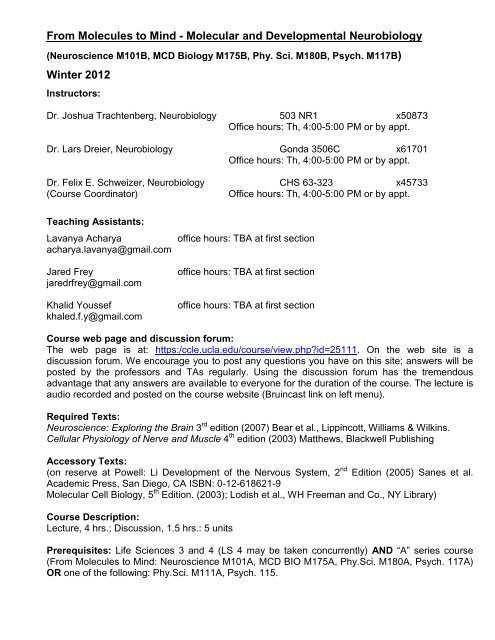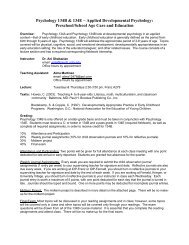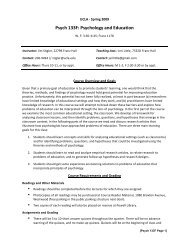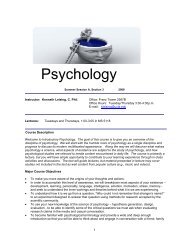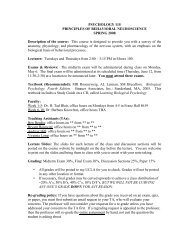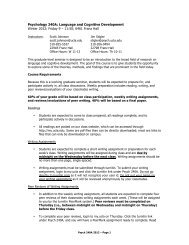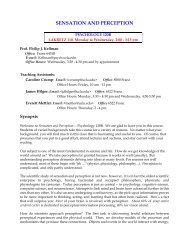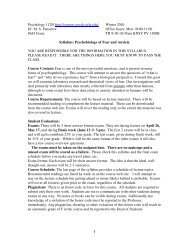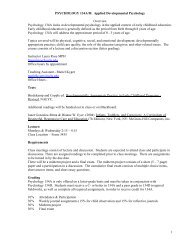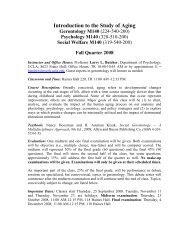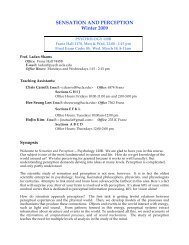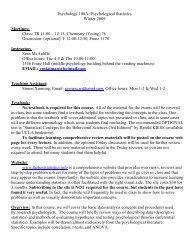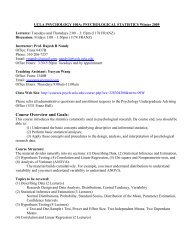Syllabus - Courses in Psychology - UCLA
Syllabus - Courses in Psychology - UCLA
Syllabus - Courses in Psychology - UCLA
You also want an ePaper? Increase the reach of your titles
YUMPU automatically turns print PDFs into web optimized ePapers that Google loves.
From Molecules to M<strong>in</strong>d - Molecular and Developmental Neurobiology(Neuroscience M101B, MCD Biology M175B, Phy. Sci. M180B, Psych. M117B)W<strong>in</strong>ter 2012Instructors:Dr. Joshua Trachtenberg, Neurobiology 503 NR1 x50873Office hours: Th, 4:00-5:00 PM or by appt.Dr. Lars Dreier, Neurobiology Gonda 3506C x61701Office hours: Th, 4:00-5:00 PM or by appt.Dr. Felix E. Schweizer, Neurobiology CHS 63-323 x45733(Course Coord<strong>in</strong>ator)Office hours: Th, 4:00-5:00 PM or by appt.Teach<strong>in</strong>g Assistants:Lavanya Acharyaacharya.lavanya@gmail.comJared Freyjaredrfrey@gmail.comKhalid Youssefkhaled.f.y@gmail.comoffice hours: TBA at first sectionoffice hours: TBA at first sectionoffice hours: TBA at first sectionCourse web page and discussion forum:The web page is at: https:/ccle.ucla.edu/course/view.php?id=25111. On the web site is adiscussion forum. We encourage you to post any questions you have on this site; answers will beposted by the professors and TAs regularly. Us<strong>in</strong>g the discussion forum has the tremendousadvantage that any answers are available to everyone for the duration of the course. The lecture isaudio recorded and posted on the course website (Bru<strong>in</strong>cast l<strong>in</strong>k on left menu).Required Texts:Neuroscience: Explor<strong>in</strong>g the Bra<strong>in</strong> 3 rd edition (2007) Bear et al., Lipp<strong>in</strong>cott, Williams & Wilk<strong>in</strong>s.Cellular Physiology of Nerve and Muscle 4 th edition (2003) Matthews, Blackwell Publish<strong>in</strong>gAccessory Texts:(on reserve at Powell: Li Development of the Nervous System, 2 nd Edition (2005) Sanes et al.Academic Press, San Diego, CA ISBN: 0-12-618621-9Molecular Cell Biology, 5 th Edition. (2003); Lodish et al., WH Freeman and Co., NY Library)Course Description:Lecture, 4 hrs.; Discussion, 1.5 hrs.: 5 unitsPrerequisites: Life Sciences 3 and 4 (LS 4 may be taken concurrently) AND “A” series course(From Molecules to M<strong>in</strong>d: Neuroscience M101A, MCD BIO M175A, Phy.Sci. M180A, Psych. 117A)OR one of the follow<strong>in</strong>g: Phy.Sci. M111A, Psych. 115.
Lectures:Tu, Th: 2:00-3:50 PM, WG Young Hall CS 24Discussion Sections:All discussion sections meet <strong>in</strong> Geology 4645Section 1A: 8:00-9:20 AMSection 1B: 9:30-10:50 AMSection 1C: 11:00 AM-12:20 PMSection 1D: 12:30-1:50 PMSection 1E: 2:00-3:20 PMSection 1F: 3:30-4:50 PMGrad<strong>in</strong>g:Class grades will be based on total po<strong>in</strong>ts earned as follows:Three Midterm exams (1/30, 2/21, 3/22)250 po<strong>in</strong>ts (85, 85, and 85 po<strong>in</strong>ts)Six graded Discussion Sections42 po<strong>in</strong>tsAttendance at 2 sem<strong>in</strong>ars8 po<strong>in</strong>tsTOTAL305 po<strong>in</strong>tsExams:The 3 exams are non-cumulative <strong>in</strong> content.End of module 1: 85 po<strong>in</strong>ts, Monday, Jan. 30 th , 6-8 7-9 PM, Location TBDEnd of module 2: 85 po<strong>in</strong>ts, Tuesday Feb. 21 st , 2-4 PM, CS 24End of Module 3: 85 po<strong>in</strong>ts, Thursday, March 22 nd , 11:30am – 2:30pm, Location TBDWarn<strong>in</strong>g: Cheat<strong>in</strong>g on an exam or any other section of class will result <strong>in</strong> a score of 0 for thatexam/task and notification of the office of the Dean of Students for further discipl<strong>in</strong>ary action.Discussion sections:If you prefer a discussion section different from the one that you have been assigned, you mayrequest reassignment, dur<strong>in</strong>g Week 1 ONLY, from Melissa Moran (MMoran@mednet.ucla.edu OR206-2349), room 1506D Gonda.Policy on miss<strong>in</strong>g discussion sections:We understand that there are valid circumstances that may cause you to be absent from adiscussion section (for <strong>in</strong>stance, <strong>in</strong>terviews). In order to ensure that you get credit for a misseddiscussion section you must 1) present a valid reason to the TA <strong>in</strong> advance and 2) turn <strong>in</strong> theassignment before the discussion section. There will be no flexibility <strong>in</strong> this policy.Graded Assignments for discussion sections: The discussion sections are useless if you havenot read the assigned article. To help motivate you to read each article, you are required to turn <strong>in</strong>a paper for each of the 6 discussion sections <strong>in</strong> which papers are assigned (weeks 1,2,4,5,7,8)us<strong>in</strong>g Turnit<strong>in</strong>. These papers will be graded from 0-5 po<strong>in</strong>ts by your TAs. The papers are due onthe day of the discussion section <strong>in</strong> which the read<strong>in</strong>g assignment is discussed. They mustbe turned <strong>in</strong> before the discussion section starts. In addition, po<strong>in</strong>ts will be assessed forattendance (1 po<strong>in</strong>t per session) and participation (1 po<strong>in</strong>t per session). This gives a maximumtotal of 42 po<strong>in</strong>ts.Assignments for discussion section should be typed and no more than one page. Theassignments should consist of 2 parts:
1) <strong>in</strong> one paragraph, summarize the ma<strong>in</strong> ideas of the article – why were experiments done;briefly, how were they done; what were the results and conclusions?2) <strong>in</strong> a longer section, describe your ideas, <strong>in</strong>clud<strong>in</strong>g criticism and/or praise of the article ifappropriate and suggested future experiments to resolve important issues.Lastly, plagiarism is cheat<strong>in</strong>g! Any <strong>in</strong>dication that you have copied work from a fellow student willresult <strong>in</strong> a 0 for that assignment for both students and notification of the Dean’s Office. Copy<strong>in</strong>g textdirectly from the article (or the web) without proper attribution does constitute plagiarism.Sem<strong>in</strong>ar attendance:Each student is required to attend two Neuroscience sem<strong>in</strong>ars dur<strong>in</strong>g the quarter and to turn <strong>in</strong> awritten summary for each us<strong>in</strong>g Turnit<strong>in</strong>. One sem<strong>in</strong>ar must be attended prior to the end of the6 th week and the summary is due at or before the discussion section on that day. The secondsem<strong>in</strong>ar may be at any time before the f<strong>in</strong>al discussion section and must be turned <strong>in</strong> before orat that session. The summary should be typed, no longer than one paragraph, and should conv<strong>in</strong>cethe TA that you attended and paid attention to the sem<strong>in</strong>ar. Make sure that this paragraph is <strong>in</strong> yourown words. If the TA is unconv<strong>in</strong>ced that you attended or that you have written your report<strong>in</strong>dependently, you will receive no credit (h<strong>in</strong>t: sometimes sem<strong>in</strong>ars are cancelled). Each sem<strong>in</strong>arwrite-up is worth 4 po<strong>in</strong>ts for a total of 8 po<strong>in</strong>ts. Upcom<strong>in</strong>g neuroscience sem<strong>in</strong>ars will be listedunder “Neuroscience sem<strong>in</strong>ars” at the web site: http://www.neurosci.ucla.edu/sem<strong>in</strong>ars.asp. Inaddition, we will try to periodically post upcom<strong>in</strong>g sem<strong>in</strong>ars at the beg<strong>in</strong>n<strong>in</strong>gs of lectures.
Academic Integrity(http://www.deanofstudents.ucla.edu/<strong>in</strong>tegrity.html)<strong>UCLA</strong> is a community of scholars. In this community, all members <strong>in</strong>clud<strong>in</strong>g faculty, staff andstudents alike are responsible for ma<strong>in</strong>ta<strong>in</strong><strong>in</strong>g standards of academic honesty. As a student andmember of the University community, you are here to get an education and are, therefore,expected to demonstrate <strong>in</strong>tegrity <strong>in</strong> your academic endeavors. You are evaluated on your ownmerits. Cheat<strong>in</strong>g, plagiarism, collaborative work, multiple submissions without the permission of theprofessor, or other k<strong>in</strong>ds of academic dishonesty are considered unacceptable behavior and willresult <strong>in</strong> formal discipl<strong>in</strong>ary proceed<strong>in</strong>gs usually result<strong>in</strong>g <strong>in</strong> suspension or dismissal.Forms of Academic DishonestyAs specified <strong>in</strong> the <strong>UCLA</strong> Student Conduct Code, violations or attempted violations of academicdishonesty <strong>in</strong>clude, but are not limited to, cheat<strong>in</strong>g, fabrication, plagiarism, multiple submissions orfacilitat<strong>in</strong>g academic dishonesty (see below for detailed def<strong>in</strong>itions).While you are here at <strong>UCLA</strong>, you may f<strong>in</strong>d yourself <strong>in</strong> a situation where cheat<strong>in</strong>g seems like aviable choice. You may rationalize to yourself that "Everyone else does it" Well, they don’t. And willthat matter when YOU get caught? NO! If you are unsure whether what you are consider<strong>in</strong>g do<strong>in</strong>gis cheat<strong>in</strong>g, just ask yourself ….. how would you feel if your actions were public, for anyone to see?Would you feel embarrassed or ashamed? If the answer is yes, that’s a good <strong>in</strong>dicator that you aretak<strong>in</strong>g a risk and rationaliz<strong>in</strong>g it to yourself.If after review<strong>in</strong>g the <strong>in</strong>formation below, you are still unclear about any of the items – don’t takechances, don’t just take your well-<strong>in</strong>tentioned friend’s advice – ASK your TA or your Professor.Know the rules - Ignorance is NO defense. In addition, avoid plac<strong>in</strong>g yourself <strong>in</strong> situations whichmight lead your TA or Professor to suspect you of cheat<strong>in</strong>g. For example, dur<strong>in</strong>g an exam don’tsit next to someone with whom you studied <strong>in</strong> case your answers end up look<strong>in</strong>g "too similar."Alternatives to Academic Dishonesty* Seek out help – meet with your TA or Professor, ask if there is special tutor<strong>in</strong>g available.* Drop the course – can you take it next quarter when you might feel more prepared and lesspressured?* Ask for an extension – if you expla<strong>in</strong> your situation to your TA or Professor, they mightgrant you an extended deadl<strong>in</strong>e.* See a counselor at Student Psychological Services, and/or your school, college ordepartment – <strong>UCLA</strong> has many resources for students who are feel<strong>in</strong>g the stresses ofacademic and personal pressures (see below).Remember, gett<strong>in</strong>g caught cheat<strong>in</strong>g affects more than just your GPA. How will you expla<strong>in</strong> toyour parents, family and friends that you have been suspended or dismissed? How will it affectyour f<strong>in</strong>ancial aid award and/or scholarship money? Will you be required to, and be able to payback that money if you are no longer a student? If you live <strong>in</strong> the residence halls, where will you goif you are told you can no longer live there?
You have worked very hard to get here, so don’t cheat! If you would like more <strong>in</strong>formation, pleasecome see us at the Dean of Students’ Office <strong>in</strong> 1206 Murphy Hall, call us at (310) 825-3871 or visitour Web site at www.deanofstudents.ucla.edu.Cheat<strong>in</strong>g• Unauthorized acquir<strong>in</strong>g of knowledge of an exam<strong>in</strong>ation or part of an exam<strong>in</strong>ation• Allow<strong>in</strong>g another person to take a quiz, exam, or similar evaluation for you• Us<strong>in</strong>g unauthorized material, <strong>in</strong>formation, or study aids <strong>in</strong> any academic exercise orexam<strong>in</strong>ation – textbook, notes, formula list, calculator, etc.• Unauthorized collaboration <strong>in</strong> provid<strong>in</strong>g or request<strong>in</strong>g assistance, such as shar<strong>in</strong>g<strong>in</strong>formation• Unauthorized use of someone else’s data <strong>in</strong> complet<strong>in</strong>g a computer exercise• Alter<strong>in</strong>g a graded exam or assignment and request<strong>in</strong>g that it be regradedPlagiarismPresent<strong>in</strong>g another’s words or ideas as if they were one’s own• Submitt<strong>in</strong>g as your own through purchase or otherwise, part of or an entire work producedverbatim by someone else• Paraphras<strong>in</strong>g ideas, data or writ<strong>in</strong>g without properly acknowledg<strong>in</strong>g the source• Unauthorized transfer and use of someone else’s computer file as your own• Unauthorized use of someone else’s data <strong>in</strong> complet<strong>in</strong>g a computer exerciseMultiple SubmissionsSubmitt<strong>in</strong>g the same work (with exact or similar content) <strong>in</strong> more than one class without permissionfrom the <strong>in</strong>structor to do so. This <strong>in</strong>cludes courses you are currently tak<strong>in</strong>g, as well as courses youmight take <strong>in</strong> another quarterFacilitat<strong>in</strong>g Academic DishonestyParticipat<strong>in</strong>g <strong>in</strong> any action that compromises the <strong>in</strong>tegrity if the academic standards of theUniversity; assist<strong>in</strong>g another to commit an act of academic dishonesty• Tak<strong>in</strong>g a quiz, exam, or similar evaluation <strong>in</strong> place of another person• Allow<strong>in</strong>g another student to copy from you• Provid<strong>in</strong>g material or other <strong>in</strong>formation to another student with knowledge that suchassistance could be used <strong>in</strong> any of the violations stated above (e.g., giv<strong>in</strong>g test <strong>in</strong>formationto students <strong>in</strong> other discussion sections of the same course)FabricationFalsification or <strong>in</strong>vention of any <strong>in</strong>formation <strong>in</strong> an academic exercise• Alter<strong>in</strong>g data to support research• Present<strong>in</strong>g results from research that was not performed• Credit<strong>in</strong>g source material that was not used for research
Places to go for help when you are feel<strong>in</strong>g overwhelmed and need personal and/oracademic assistance:(In addition to the resources listed below, you can get assistance from a counselor <strong>in</strong> yourcollege/dept., check out the current schedule of classes under "Academic Counsel<strong>in</strong>g" tof<strong>in</strong>d the location and phone number)* Letters & Science Counsel<strong>in</strong>g ServiceA316 Murphy Hall: (310) 825-1965www.college.ucla.edu* Academics <strong>in</strong> the Commonsat Covel Commons: (310) 825-9315free workshops on a wide variety ofissues relat<strong>in</strong>g to academic & personalsuccesswww.orl.ucla.edu (click on"academics")* College Tutorialsat Covel Commons: (310) 825-9315free tutor<strong>in</strong>g for ESL/math &science/composition/and more!www.college.ucla.edu/up/ct/* Lesbian, Gay, Bisexual and TransgenderResource Center220 K<strong>in</strong>sey Hall: (310) 206-3628www.lgbt.ucla.edu* Office for Students with DisabilitiesA255 Murphy Hall: (310) 825-1501,TDD (310) 206-6083www.saonet.ucla.edu/osd* Office of International Students andScholars106 Bradley Hall: (310) 825-1681www.<strong>in</strong>tl.ucla.edu* Student Legal Services70 Dodd Hall: (310) 825-9894www.studentlegal.ucla.edu* Student Psychological Services4223 Math Sciences: (310) 825-0768A3-062 Center for Health Sciences:(310) 825-7985www.saonet.ucla.edu/sps.htm* Center for Women and Men2 Dodd Hall: (310) 825-3945www.thecenter.ucla.edu* Dean of Students Office1206 Murphy Hall: (310) 825-3871www.deanofstudents.ucla.edu
Module 1 – Dr. Joshua TrachtenbergDON’T SWEAT THE DETAILS ON READINGS. I’LL GIVE YOU THE DETAILS IN LECTURE.JUST READ THROUGH FOR THE BIG PICTURE.WEEK 1Tu, January 10, 2012Lecture:Read<strong>in</strong>g:Nervous system development/Regional Pattern<strong>in</strong>g – neurulationthe organizer and neural <strong>in</strong>ducers, anterior-posterior axis.Sanes, Chapter 1, pp. 7-28, <strong>in</strong>clud<strong>in</strong>g the Box, Chapter 2, pp.29-46Th, January 12, 2012Lecture:Read<strong>in</strong>g:Regional Pattern<strong>in</strong>g II / Neurogenesis & Migration – Dorsoventral axis, generationof neurons and glia, cellular migrationDessaud, McMahon and Briscoe (2008) Pattern formation <strong>in</strong> the vertebrateneural tube: a sonic hedgehog morphogen-regulated transcriptional network.Rash and Grove (2006) Area and layer pattern<strong>in</strong>g <strong>in</strong> the develop<strong>in</strong>g cerebralcortex. Current Op<strong>in</strong>ion <strong>in</strong> NeurobiologyNadarajah & Parnavelas (2002) “Modes of neuronal migration <strong>in</strong> the develop<strong>in</strong>gcerebral cortex” Nature Reviews Neuroscience 3:423Sanes, Chapter 2, pp. 46-56, Chapter 3, NOT the BoxesFr, January 13, 2012Discussion:Nishiyama, et. al., (2003) Cyclic AMP/GMP-dependent modulation of Calcium channels setsthe polarity of nerve growth-cone turn<strong>in</strong>g. Nature. 423:990WEEK 2Tu, January 17, 2012Lecture: Determ<strong>in</strong>ation and Differentiation / Cell Polarity/Axon GrowthRead<strong>in</strong>g: Sanes, Chapter 4, Chapter 5, pp. 111-123.Wong & Ghosh (2002) “Activity-dependent regulation of dendritic growth andpattern<strong>in</strong>g” Nature Reviews Neuroscience 3:803.Jan & Jan (2010) "Branch<strong>in</strong>g out: mechanisms of dendritic arborization" NatureReviews Neuroscience 11:317
Th, January 19, 2012Lecture:Read<strong>in</strong>g:Axon Guidance / Target SelectionPolleaux, Ince-Dunn, Ghosh (2007) Transcriptional regulation of vertebrate axonguidance and synapse formation. Nature Reviews NeuroscienceSanes, Chapter 5, pp. 123-138 & Box 3 (pp. 142-144). Chapter 6.Fr, January 20, 2012Discussion:Hattori et al. (2009) Robust discrim<strong>in</strong>ation between self and non-self neurites requiresthousands of Dscam1 isoforms. Nature. 461:644WEEK 3Tu, January 24, 2012Lecture:Read<strong>in</strong>g:Neuron Death / Synapse Formation.Sanes, Chapter 7, Chapter 8, pp. 207-230. NOT the Boxes.Th, January 26, 2012Lecture:Review for ExamNOTE: You will be held responsible for both of the discussion papers on the exam.Fr, January 27, 2012Discussion: Review session for ExamMonday January 30, 2012, 6-8 7-9 PM, TBA MIDTERM EXAM, MODULE 1
Module 2 – Dr. Lars DreierWEEK 4Tu, January 31, 2012Guest Lecture: Dr. Joanna Jen – Insights <strong>in</strong>to bra<strong>in</strong> development from patients withrare <strong>in</strong>herited disordersLecture: Voltage gated channels 1. Review of action potential; basic parts of an ionchannel; transmembrane topology and stoichiometry of voltage gated ionchannels; permeability and ion selectivity; structure / function of the channel pore.Read<strong>in</strong>g: Bear, pp. 80-92 and 67-70.Th, February 2, 2012Lecture: Voltage gated channels 2. Structure / function of the voltage sensor (S4 region);<strong>in</strong>activation mechanisms – the “ball and cha<strong>in</strong>” model, ion pumps and theNa + /K + ATPase.Read<strong>in</strong>g: Bear, pp. 86-89, 65-67.Fr, February 3, 2012Discussion: Waters et al. (2006). Mutations <strong>in</strong> voltage-gated potassium channel KCNC3 causedegenerative and developmental central nervous system phenotypes.Nature Genetics 38: 447-451.WEEK 5Tu, February 7, 2012Lecture: Ligand-gated channels 1. Acetylchol<strong>in</strong>e receptors and glutamate receptors.Read<strong>in</strong>g: Bear, pp 111-126, 138-141, 152-156.Th, February 9, 2012Lecture: Ligand-gated channels 2. GABA and glyc<strong>in</strong>e receptors.Read<strong>in</strong>g: Bear, pp.126-128, 156-157, 670-671Fr, February 10, 2012Discussion: Park et al. (2004). Recycl<strong>in</strong>g Endosomes Supply AMPA Receptors for LTP.Science 305: 1972-1975.
WEEK 6Tu, February 14, 2012Lecture: TRP channels. TRP channels are critical for the sensations of touch, pa<strong>in</strong>, taste,hear<strong>in</strong>g, and smell.Read<strong>in</strong>g: Bear, pp. 418-420, 358-360, 410-411.Th, February 16, 2012Lecture: G prote<strong>in</strong>-coupled receptors. Basic structure of G prote<strong>in</strong>-coupled receptors; basicmechanism of G prote<strong>in</strong> cascades.Read<strong>in</strong>g: Bear, pp. 157-165, 111-112, 118-119, 148-152.Fr, February 17, 2012Discussion: Review section for the Module 2 midterm exam.Note: First Sem<strong>in</strong>ar paper due!WEEK 7Tu, February 21, 2012Tuesday, February 21, 2012, 2-4 PM, CS 24 MIDTERM EXAM, MODULE 2
Module 3 – Dr. Felix SchweizerWEEK 7 cont<strong>in</strong>uedTh, February 23, 2012Lecture: Synaptic Transmission I. Electrical and chemical transmission.Read<strong>in</strong>g: Bear, Chapter 5, pp. 101-108.Fr, February 24, 2012Discussion: No discussion section!WEEK 8Tu, February 28, 2012Lecture: Neurotransmitters and calcium dependence of release.Read<strong>in</strong>g: Bear, Chapter 6, pp 141-152. Bear Chapter 5, 106-109, 111-117.Th, March 1, 2012Lecture: Synaptic Transmission II. Molecular Mechanisms.Read<strong>in</strong>g: Bear, Chapter 5, pp. 111-117.Fr, March 2, 2012Discussion:del Castillo & Katz (1954) “Quantal components of the end plate potential.” J.Physiol. 124, 560-573WEEK 9Tu, March 6, 2012Lecture: Neuronal structure and cytoskeleton.Read<strong>in</strong>g: Bear Chapter 2, pp. 35-45.Th, March 8, 2012Lecture: Microtubules, Dendrites and Sp<strong>in</strong>es.Read<strong>in</strong>g: Bear Chapter 2, pp. 35-45.Fr, March 9, 2012Discussion: Anatol C. Kreitzer & Robert C. Malenka (2007) ”Endocannab<strong>in</strong>oid-mediated rescueof striatal LTD and motor deficits <strong>in</strong> Park<strong>in</strong>son’s disease models” Nature 445, 643-647.
Note: Second sem<strong>in</strong>ar paper due.WEEK 10Tu, March 13, 2012Lecture: Cells, Networks and Plasticity.Read<strong>in</strong>g: Bear, Chapter 24, pp 716-723.Th, March 14, 20122-~3pm Guest Lecture: Prof. Beate Ritz, MD, PhD, School of Public Health. Epidemiologyand neurodegenerative diseases.~3-3:50pm Review sessionThursday, March 22, 2012, 11:30am – 2:30pm, Location TBDMIDTERM EXAM, MODULE 3


